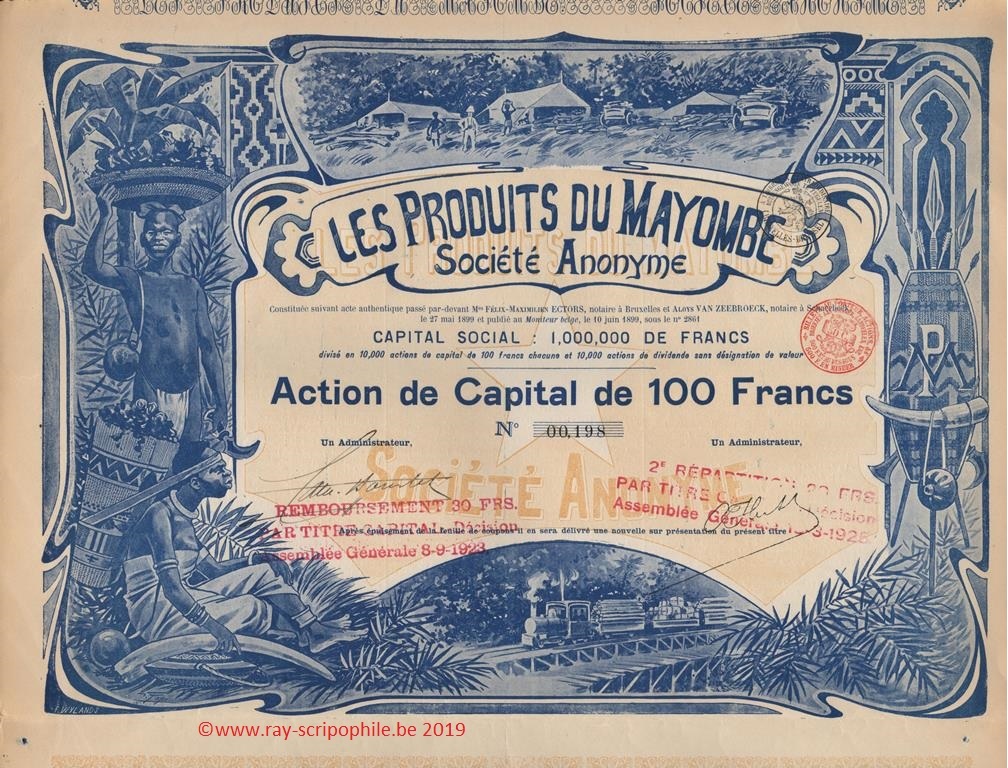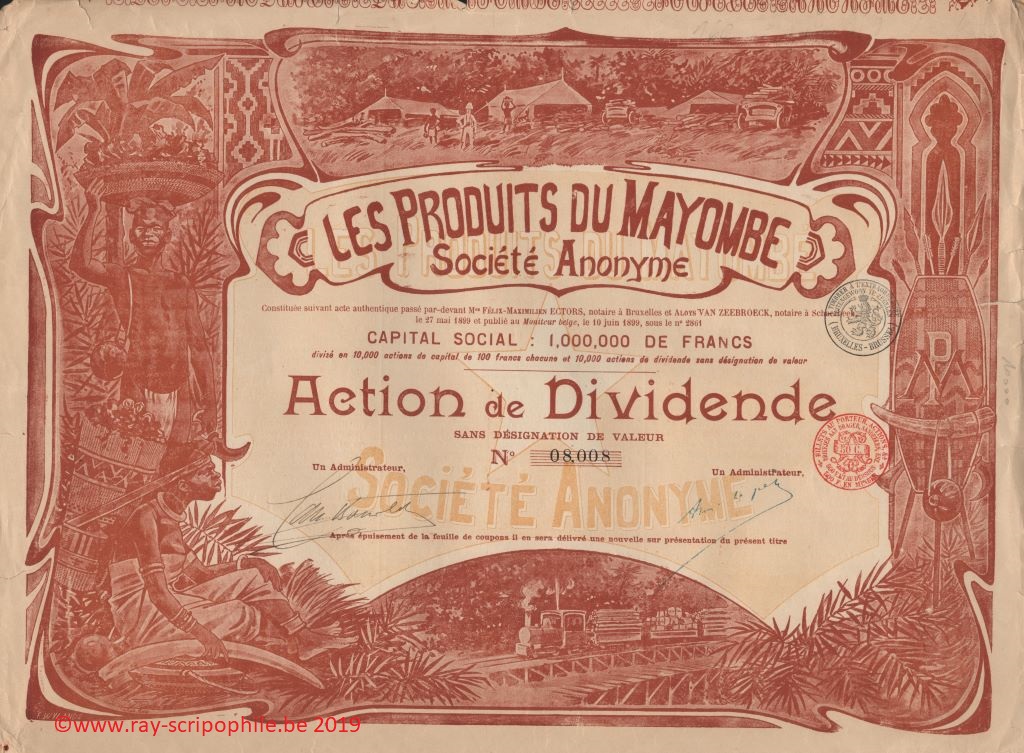LES PRODUITS DU MAYOMBE S.A.
Constitution
The Produits du Mayombé was incorporated on May 21, 1899 with a capital of 1 million francs represented by 10,000 shares with a capital of 100 francs; in addition, 10,000 dividend shares without designation of value were created. The registered office was established in Brussels.
Of the 10,000 capital shares, 2,000 were allotted for the contributions described below; the remaining 8,000 shares were subscribed for by:
La Compagnie Nationale Financière, 2.960 actions ; La Lulonga, 100 actions ; Messrs. Armand Lepère, 125 actions ; Louis Coetermans-Jenrichs, 100 actions ; Paul Simon, 125 actions ; Victor Moray, 50 actions ; Jean Dumont, 100 actions ; Camille Bourlet, 300 actions ; Gaston Beirlaen, 100 actions ; Emile Bierlaen, 50 actions ; Charles-Louis Bierlaen, 60 actions ; Gustave Dryepondt, 150 actions ; Julien Bastien, 35 actions ; Jean Gauthier, 35 actions ; Valentin Claisse, 100 actions ; Léopol Mélis, 100 actions ; Victorien Lacourt, 50 actions ; Max hemeleers, 420 actions ; Léon Lebrun, 100 actions ; Emile Declercq, 50 actions ; Emile Titeux, 50 actions ; Louis De Ridder, 700 actions ; Julien Chaltin, 50 actions ; le baron Maurice Greindl, 50 actions ; Jean Dupret, 30 actions ; Oscar Dufranne, 50 actions ; Emile Theunis, 80 actions ; Henri Masson, 40 actions ; Henri Genucchi, 110 actions ; Adhémar Daenen, 70 actions ; Arthur Pétillon, 170 actions ; Albert Chizeau, 100 actions ; Arthur Joveneau, 50 actions ; Ernest Van Melckebeke, 100 actions ; Arthur Dutoit, 50 actions ; François De Cooman pour lui et un groupe, 800 actions ; Auguste Hutt, 100 actions ; Aime Hutt, 100 actions ; le baron Adolphe van Zuylen, 75 actions ; Emile Chargois, 40 actions ; Alexandre Vandevelde, 50 actions ; Jean Corbiau, 25 actions.
The 8,000 shares were 75% paid up, i.e. a sum of 600,000 francs was made available to the Company.
The 10,000 dividend shares were distributed to the contributors listed below.
On September 12, 1899 : 6,000 shares were subscribed for at 130 francs (21-(1901 T1)-91).
Contribution(s)
Mr. Emile Titeux, in consideration of 1,400 fully paid-up shares and 1,400 dividend shares, contributed to the Company:
The results of his studies and preliminary work, his approaches, trips, and negotiations with various industrial or commercial establishments.
The result of its studies and preliminary work, its approaches, trips and negotiations with and with various industrial or commercial establishments; - The steps it took to acquire a 5,000 hectare plot of land in the Mayombe region, and to obtain an option right on a 5,000 hectare plot of land in the same region;
Of his special knowledge relating to the dispatch and reception of goods and the supply of agents in Africa, as well as of the care, work and services which he undertook to provide in all matters relating to the object of the company and this under conditions to be determined by the board of directors.
The Compagnie Nationale et Financière, in return for 600 fully paid-up shares and the remaining 8,600 dividend shares which were distributed by it in accordance with its special agreements, contributed:
Its shareholdings, support, and financial services, as well as its work, studies, and procedures for the constitution of the Company.
First Board of Directors
The board of directors was set at seven people:
Messrs. Louis De Ridder, Paul Simon, Armand Lepère, Max Hemeleers, Arthur Pétillon, Camille Bourlet, Aimé Hutt (21-(1900 T1)-109).
Object
To carry out, either directly by itself or indirectly by way of transfer, subscription, sponsorship, merger or participation of any kind, in all similar enterprises, the cultivation, exploitation, purchase and sale of all plant products generally of any kind from the Congo, such as tobacco, coffee, cocoa, rubber, coconut palms and others, as well as all operations aimed at the disposal, processing, handling or industrial or commercial use of the said products, as well as the purchase and resale or exchange in the Congo of all Belgian or foreign products.
To be able to carry out, in this connection, all commercial or industrial operations or undertakings, to establish, either on the premises of its operations or elsewhere, all counters, factories, offices, stores, outlets, warehouses, building sites, factories and generally all commercial, industrial or other establishments that it deems useful for the sale, purchase, exchange, handling or processing of the aforementioned products. It could either acquire the real estate necessary or useful to its trade or industry, or obtain the enjoyment thereof by way of assignment, lease, usufruct, concession or any other means, as well as make use of any purchase or enjoyment options reserved to it in this connection (12-(10/06/1899)-2861).
Event(s)
1901 - The Company's program included rubber and cocoa plantations on 5,000 hectares of land along the railway. For immediate profits, the Company established a fully operational model farm on 1,000 hectares and 4 factories in Lovo, Kisundi, Luki and Boma (21-(1901 T1)-91).
1902 - Out of the 5,000 hectares planned, only 1,123 hectares were handed over, the factories in Luki and Boma were giving good results; the factory in Kisundi was abolished and the factory in Lovo had been moved to Tchipipidi. Cattle breeding failed but small barnyard animals and market gardening prosperous (21-(1902 T1)-79).
1903 - As for the whole Mayombé region, the results were poor.
1904 - The balance sheet showed a further loss of 287,000 francs. The liquidators of Compagnie Nationale Financière held 7,594 shares of capital and dividend income from Mayombé (21-(1906 T1)-69).



